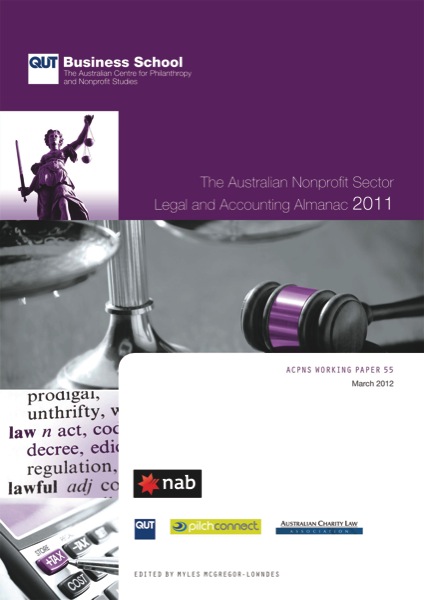Published annually by the Australian Centre for Philanthropy and Nonprofit Studies, the Almanac canvasses the major developments in not-for-profit (NFP) law and accounting in the previous year. This includes a review of court decisions, changes to Australian legislation, accounting and auditing standards, developments in taxation and other NFP administration matters. The Centre also provides readers with articles on key issues and a forecast of the changes predicted for 2012.
The most recent edition includes:
- Federal Government’s NFP Reform Agenda: summary of all major public consultations, including the Australian NFP and Charities Commission (ACNC)
- Governance: lessons learned in 2011 and tips for your organisation
- Meaning of ‘charitable’: changes in the new ruling regarding distributions to members, profit making and accumulating funds, commercial activities, and political purpose
- Public ancillary funds: main areas of change under the new regulatory framework
- New Work Health and Safety Act: coming into operation in most states and territories.
Legal cases
Charitable status – fit or healthy?
Promoting fitness in the community can be a ‘charitable purpose’ as required for income tax and GST exemptions. However, it is not enough to be considered a health promotion charity for Deductible Gift Recipient (DGR) status or Fringe Benefits Tax exemption (Bicycle Victoria Inc v Commissioner of Taxation).
Membership discrimination
It was found that a golf club’s practices in limiting hours for female players, out of proportion to their representation in club membership, was sex discrimination (Walker v Wakehurst Golf Club Ltd).
Governance and directors
Directors who fail to take all reasonable steps to fulfil their duties of care and diligence, even if the failure is in good faith, will be held liable for the matters they should have known about. This duty cannot be delegated to anyone else (ASIC v Healey and Others).
Resisting tax
Private tax rulings cease to be binding when the organisation’s circumstances change and cannot be used as grounds to resist a revised tax assessment (Mount Pritchard and District Community Club v Commissioner of Taxation).
Where there’s a will, there’s a charity
If a general charitable intention in a bequest can be established, the fact that the entity named in the will no longer exists does not defeat the gift if an appropriate successor entity which provides similar services or community benefit exists (Maher v Attorney-General (QLD)).
Removing trustees
The Attorney-General needs to be involved in charitable trustee removal matters, regardless of whether the Attorney-General believes this to be the case (Tomasevic v Jovetic).
New legislation
Commonwealth
New regulatory framework for public ancillary funds has been inserted into the Income Tax Assessment Act 1997. This includes guidelines made by the Treasurer and a power for the Commissioner of Taxation to impose sanctions on trustees and directors of trustees that breach the guidelines.
Victoria
The Associations Incorporation Reform Bill 2011 has been introduced, replacing the 1981 Act. Key proposed reforms include three reporting tiers, a new set of model rules, codification of office holders’ legal duties, and introduction of a business judgement rule defence and right to be indemnified for expenses.
Queensland
The previous government introduced a provision into the Associations Incorporation Act 1981 to enable associations to transfer directly to a corporation, or Aboriginal or Torres Strait Islander corporation. Transfers must be authorised by the Office of Fair Trading or Minister.
Western Australia
The Charitable Trusts Act 1962 was amended to allow private ancillary funds and ancillary funds to have a power for trustees to give to DGRs (but not if inconsistent with the trust deed). To access the provision, trustees must execute a deed saying the new law will apply to the trust.
Accounting and auditing standards
This section of the Almanac includes a list of practical tips on how treasurers can ensure they meet their various legal obligations.
- Odette Fleminghttps://thirdsector.com.au/author/odette-fleming/
- Odette Fleminghttps://thirdsector.com.au/author/odette-fleming/
- Odette Fleminghttps://thirdsector.com.au/author/odette-fleming/
- Odette Fleminghttps://thirdsector.com.au/author/odette-fleming/











